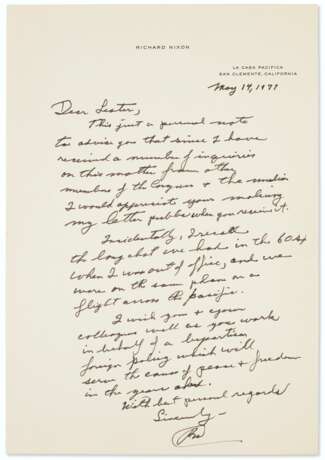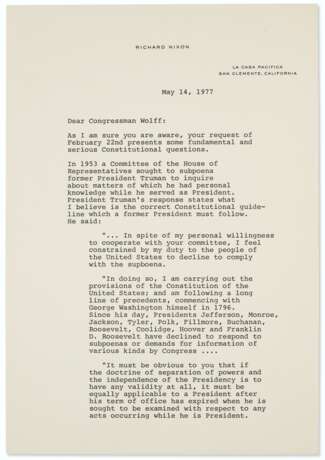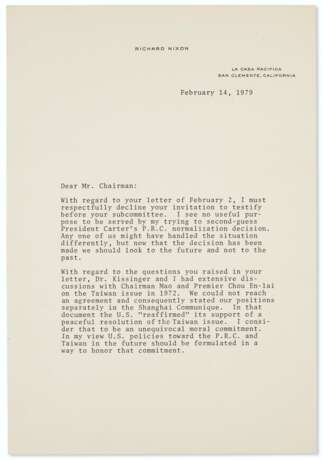ID 517680
Los 34 | On his secret aid pledge to Hanoi
Schätzwert
$ 8 000 – 12 000
Richard Nixon, 14 May 1977
NIXON, Richard M. (1913-1994). Autograph letter signed ("RN") to Rep. Lester Wolff, San Clemente, 14 May 1977. [With:] Typed letter signed ("Richard Nixon") to Rep. Lester L. Wolff, San Clemente, 14 May 1977; typed letter signed ("Richard Nixon") to Rep. Lester Wolff, San Clemente, 14 February 1979.
Seven pages total, 265 x 185mm on his personal letterhead.
Richard Nixon confirms and defends his secret offer of U.S. aid to Hanoi during the 1972-1973 Vietnam peace conference and invokes executive privilege. An important series of letters written in response to a request for information from the House International Relations Subcommittee on Asian and Pacific affairs, chaired by Congressman Lester L. Wolff. In February 1976, the People's Republic of Vietnam reported that Richard Nixon had pledged $3.25 billion in U.S. aid to North Vietnam as part of the negotiations that resulted in the Paris Peace Accords. Despite the fact that violations of the terms by the North Vietnamese scuttled the agreement rendering it null and void, Hanoi still insisted the pledge was binding. In light of the fact that the State Department had insisted that the U.S. had never offered a specific dollar figure in any negotiations at the time, affair set off a firestorm resulting in a request for Nixon to testify before Congress. On 14 May, Nixon wrote a lengthy typed letter in response that would be the first written confirmation of that aid pledge. Claiming executive privilege, Nixon cited Harry Truman's refusal to testify before Congress in 1953, but also sought to be as helpful as possible assuring the committee that the aid pledge "had to be implemented in accordance with each country's 'constitutional provisions,' which, in the United States, means approval by Congress," and that the "aid proposal was not at any time presented to them as a part of the 'price' to obtain the Peace Agreement." The same day Nixon transmitted his formal reply to Congress, he also sent a personal, handwritten letter to Wolff asking that his formal statement be made public, and adding a personal recollection of "the long chat we had in the 60s when I was out of office, and we were on the plane on a flight across the Pacific." He closed by wishing him and his "colleagues well as you work in behalf of a bipartisan foreign policy which will serve the cause of peace & freedom in the years ahead."
Nixon and the committee reached a compromise, and rather than have the former President testify in person, the parties agreed to a phone call to discuss the affair (a transcript is part of the lot). In 1979, Wolff invited Nixon to testify before Congress again, this time concerning President Jimmy Carter's decision to normalize relations with Vietnam: "I see no useful purpose to be served by my trying to second -guess Present Carter's P.R. C. normalization decision. Any one of us might have handled the situation differently, but now that the decision has been made we should look to the future and not to the past." An important archive of material concerning not only the foreign relations of the United States, but the nature and extent of executive privilege and the principle of separation of powers. Provenance: Hon. Lester L. Wolff.
[Also with:] WOLFF, Lester L. (b. 1919). Autograph manuscript, n.p., n.d. 3pp. discussing the significance of the affair: "What's this all about – is whether or not Nixon misused 5 billion in aid to North Vietnam subject to Congressional approval or not…"; BRENNAN, John. Typed letter signed as assistant to the Richard Nixon to Lester L. Wolff, [San Clemente], 3 June 1977; the text of Wolff's request for information concerning the aid promise to North Vietnam on Congressional letterhead; the text of Nixon's 1 February 1973 message to the North Vietnamese Prime Minister; a transcript of a telephone conversation between Nixon and Wolff and several other Members of Congress, 15 June 1977; and copies and clippings of relevant news articles on the affair.
| Adresse der Versteigerung |
CHRISTIE'S 20 Rockefeller Plaza 10020 New York Vereinigten Staaten | ||||||||||||||
|---|---|---|---|---|---|---|---|---|---|---|---|---|---|---|---|
| Vorschau |
| ||||||||||||||
| Telefon | +1 212 636 2000 | ||||||||||||||
| Fax | +1 212 636 4930 | ||||||||||||||
| Nutzungsbedingungen | Nutzungsbedingungen | ||||||||||||||
| Versand |
Postdienst Kurierdienst Selbstabholung | ||||||||||||||
| Zahlungsarten |
Banküberweisung | ||||||||||||||
| Geschäftszeiten | Geschäftszeiten
|








